At Pfizer, every clinical trial, every product release and every patient service brings us closer to becoming the world's leading innovative biopharmaceutical company. - Ian C. Read, Pfizer CEO
Pfizer, the veteran “cosmic†pharmaceutical company, is able to maintain its long-lasting secret of embracing innovation, and is no exception in this wave of digital innovation.
The Arterial Network found that Pfizer explored digital innovation in its entire business process through self-construction, cooperation, investment, etc., and tried to include innovations such as AI+ drug development, electronic data collection, clinical data management, digital marketing, patient empowerment, and digital supply chain. From concept to practice, Pfizer provides new ideas for digital innovation in large pharmaceutical companies.
The emphasis on technology is the reason why Pfizer embraces digital transformation.
Brian Arthur wrote in The Essence of Technology: Technology has brought us a comfortable life and endless wealth, as well as economic prosperity. In a word, our world is changing by technology. This sentence is equally applicable to the pharmaceutical industry: technology brings endless wealth to the pharmaceutical industry, creating a high level of prosperity in the pharmaceutical industry.
The foundation of the pharmaceutical industry is the successful commercialization of a certain type of drug or therapy. Drug discovery is the core link of pharmaceutical companies. In addition, there are many links in clinical research, marketing, and patient services that will affect Pharmaceutical companies gain revenue from the market.
Why do we think that digital technology is reshaping the pharmaceutical industry? It shows the following characteristics:
1. The new technology represented by AI improves the efficiency of drug discovery and can reduce the screening of drugs that have taken years to several years to a few weeks;
2. Data acquisition and mining technology represented by electronic data collection and electronic health records can enhance the utilization of clinical research and drug listing data by pharmaceutical companies, and provide data insights for relevant links;
3. The popularity of the doctor community and doctor tools has enabled pharmaceutical companies to find ways to reach their doctors with low cost, high efficiency, and wide coverage, which in turn affects their prescriptions;
4. Patients participate in the diagnosis and treatment process through the Internet platform, and have exerted greater enthusiasm in the treatment. This is a new topic that pharmaceutical companies need to face.
From the point of view of time, it is the concentrated outbreak of digital transformation of pharmaceutical companies. First, although digital technology has been popular in the past 20 years, it has only recently been put on the agenda as an integrated solution. Secondly, mature cases are available for the pharmaceutical industry to apply digital technology or tools. With reference to the sample, mature experience can be replicated on a large scale.
Digital tools in the pharmaceutical industry
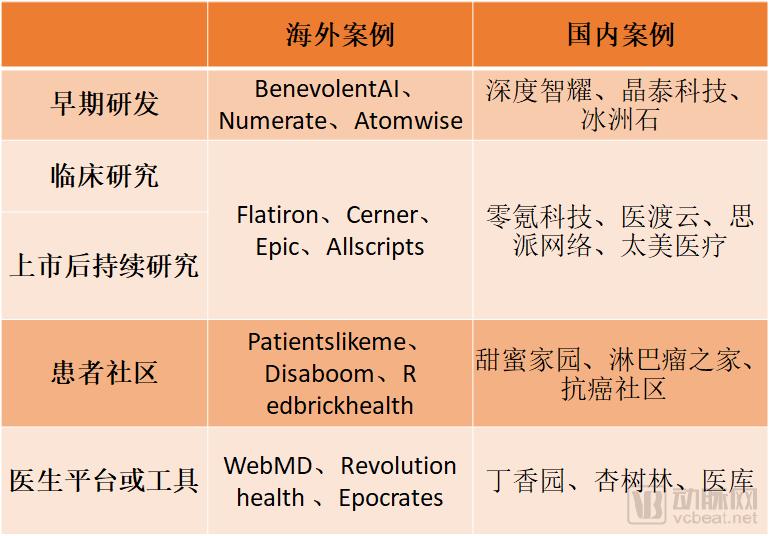
As a veteran pharmaceutical company, Pfizer has shown great enthusiasm for digital transformation, and has tried in AI+ drug development, big data, digital marketing, and patient services.
Pfizer Digital Innovation Overview
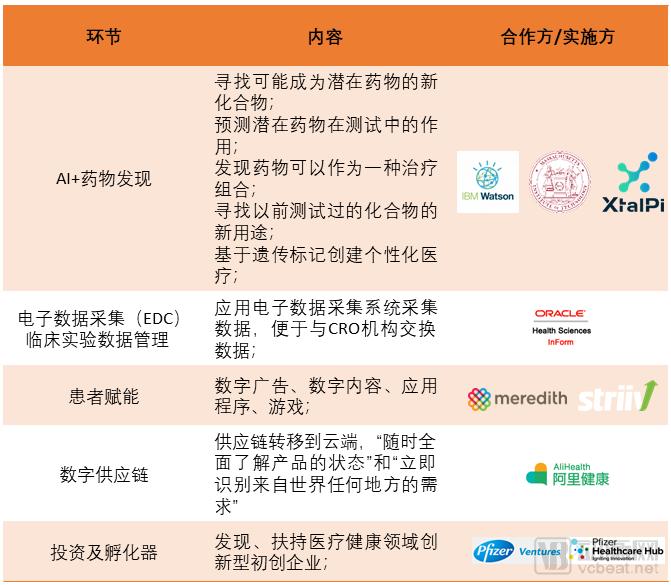
Analysis of the reasons for Pfizer's digital innovation
We can divide the reasons for Pfizer's digital innovation into internal and external perspectives. As mentioned above, the pharmaceutical industry is undergoing a process of digital transformation in recent years, and Pfizer as a company with innovative genes will naturally not fall behind.
From an internal perspective, digital innovation can enhance the efficiency of Pfizer's drug development, clinical research, marketing, and brand building, and accelerate the process of commercialization of drugs. This is an investment in the “futureâ€.
Second, digital innovation is not a big investment. For Pfizer, with annual revenues of tens of billions of dollars, the investment in digital innovation will not be fundamental. It is a very cost-effective investment to get future development opportunities at a relatively low cost.
Furthermore, Pfizer's digital innovation is not completely unproductive. It has revolutionized the original process through cooperation with various service providers, and has made good progress in AI+ drug discovery, clinical data management, and patient empowerment.
Below, let's look at a set of data:
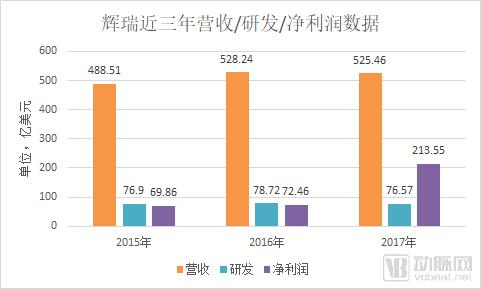
Data source, Pfizer Annual Report, Arterial Network Mapping
2017 net profit surged from the Tax Deduction and Employment Act TCJA
It can be seen from the data that Pfizer is in a stable development period, whether it is revenue or R&D investment. It is the steady development of the company that brings opportunities for digital innovation. With good business support, Pfizer has the ability and willingness to carry out some digital innovation attempts that will help the future business.
In the future, Pfizer's digital innovation will continue. For a well-established pharmaceutical company that has stood for centuries, digital innovation can bring vitality and vitality to the organization. This may be the reason why Pfizer actively embraces digital innovation.
Ambition, dream, doer
Before entering the Pfizer digital innovation process, we briefly reviewed the history of Pfizer's development.
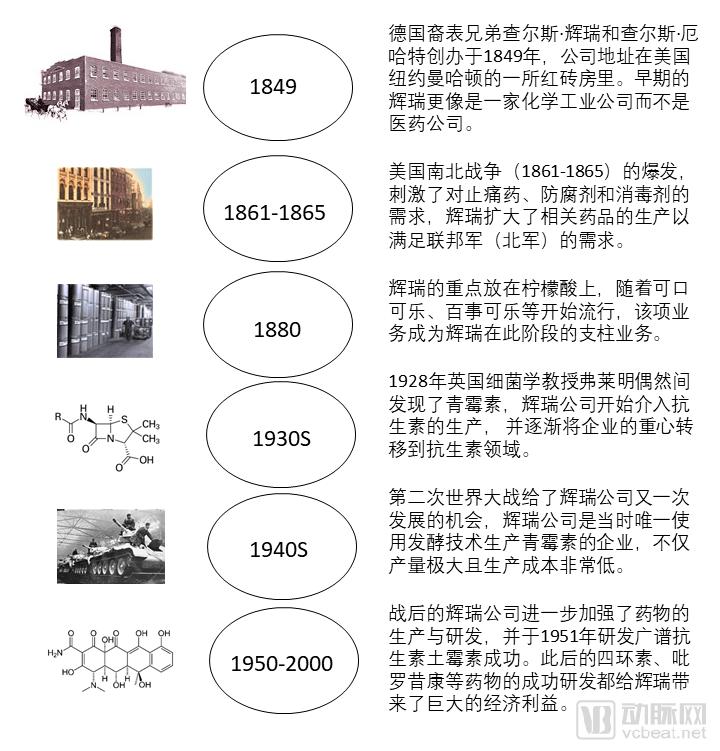
In 1998, Pfizer's research and development of Sildenafil (Wan Aike) went public and achieved unprecedented success. Pfizer also acquired Warner-Lambert Pharmaceuticals and 60 billion for US$93 billion for the great commercial success of Viagra. The dollar bought Pharmacia Pharmacia and became the largest pharmaceutical manufacturer in the United States.
After entering the 21st century, Pfizer further focused on the prescription drug business, gradually splitting, selling or independently listing businesses with low relevance to the prescription drug business, including medical devices, animal health, and daily necessities. For example, in 2013, Zoetis, a subsidiary of Pfizer's animal health business, was spun off, and its current market value is close to $45 billion.
Marketing ability is one of the keys to Pfizer's ability to maintain success. Pfizer has increased its brand awareness through professional publications, increased contact with doctors, and medical education for patients. One of the most talked about is the competition between Pfizer's Lipitor and Merck's Shu-Shang, which was originally the dominant new drug, but Pfizer took Lipitor to a cholesterol drug through a series of marketing. Throne.
In addition, targeted acquisitions are also one of Pfizer's biggest highlights. Pfizer has successively acquired heavy drugs such as Lipitor, Celebrex and Bextra through acquisitions, which not only effectively complemented the product line, but also laid the foundation for continued expansion. . The data show that since 2000, the drugs acquired through the acquisition have contributed more than 40% of Pfizer's income.
Of course, continuous high R&D investment is also an important feature of Pfizer. According to Statista, Pfizer's cumulative R&D investment in 2006-2017 reached US$96.8 billion. Among them, the R&D investment in 2017 was 7.657 billion US dollars, and the R&D/sales ratio was 14.57%.
It can be summarized that in the early 100 years of Pfizer, adjusting the business with strong market demand is the key to success; after entering the “golden age†of drug discovery, marketing + acquisition + R&D is Pfizer capable of maintaining long-term competition. The "three-axe" of force.
In 2017, Pfizer has 10 drugs that reach the “blockbuster†level – sales revenues of $1 billion, including Prevnar13 (pneumococcal vaccine, $5.61 billion), Lyrica (painkillers, $5.065 billion), Ibrance (breast cancer, $ 3.126 billion) and so on.
Pfizer's 2017 sales of TOP10 drugs
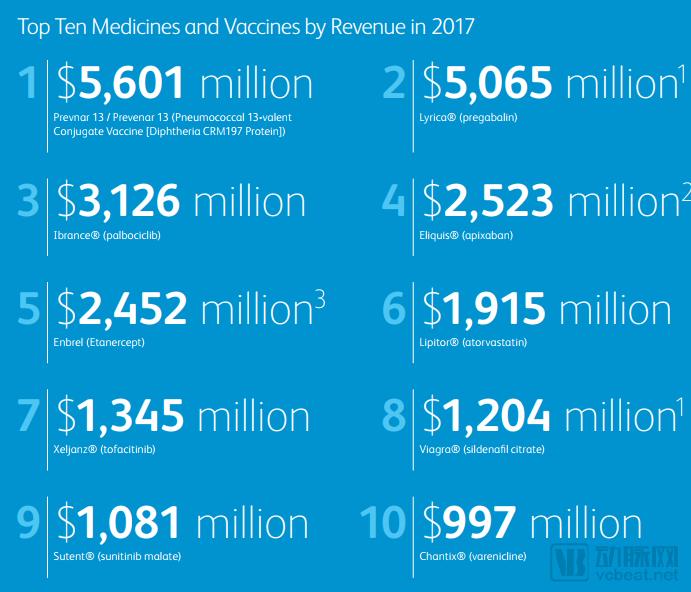
1. Pfizer has reached cooperation with IBM, MIT and XtalPi in the field of AI+ new drugs
The reason pharmaceutical companies use artificial intelligence and machine learning for drug discovery is that drug discovery is becoming more "difficult" and more "expensive." Data from the US Pharmaceutical Research and Manufacturers (PhRMA) show that this process takes at least a decade from initial discovery to market launch, with about six to seven years spent on clinical trials. Less than 12% of the drugs entering the clinical trial will eventually be approved.
According to data from the Tufts Drug Research Center, the average cost of developing and obtaining new drug approvals is $2.558 billion. The figure is based on an estimated average direct cost of $1.395 billion and a time cost of $1,163 million (expected returns that investors gave up during drug development).
So some big pharmaceutical companies try to use AI:
Find new compounds that may become potential drugs;
l predict the role of potential drugs in testing;
l found that the drug can be used as a therapeutic combination;
l Find new uses for previously tested compounds;
l Create personalized medicine based on genetic markers;
The list of major pharmaceutical companies includes Pfizer, Roche, Novartis, Bayer and others.
In December 2016, IBM announced that Pfizer will be one of the first companies to utilize the Watson for Drug Discovery platform. The collaboration is aimed at cancer treatment and aims to “help scientific researchers discover new drug targets and alternative drug indications.†Watson for Drug Discovery has accumulated 25 million Medline article summaries and 1 million medical journal articles, and processed These data require 200-300 human researchers to spend a year.
Watson for Drug Discovery allows users to analyze "private data, such as lab reports," and provides researchers with the ability to "potentially visualize" the potential relationships between different data sets.
According to Albert Bourla, president of Innovative Health, the best way to get the body to fight cancer is to combine some drugs to stimulate the immune system. But the possible combinations are countless, so the biggest challenge is finding ways to narrow down and predict which combinations might be more effective. Thanks to Watson who has experienced historical data training, we are working hard to predict new drug combinations.
In April 2018, Pfizer participated in a £1 billion ($1.4 billion) artificial intelligence investment program led by the UK government, which will be used to fund technical research on the application of artificial intelligence in various industries.
In May 2018, Pfizer joined the MIT Machine Learning for Pharmaceutical Discovery and Synthesis Consortium. In the same month, Pfizer plans to expand its partnership with Chinese technology startup XtalPi. Develop an artificial intelligence platform to model small molecule drugs as part of their discovery and development efforts. The project will combine quantum mechanics and machine learning to help predict the medicinal properties of various molecular compounds.
2. Pfizer's digital innovation in electronic data collection (EDC) and clinical experiment management
In June 2016, Pfizer partnered with Oracle to select Oracle Health Sciences InForm Cloud Services and Oracle Siebel Clinical Trials to manage and monitor cloud services in its clinical trial components.
Oracle's clinical trial component products are based on cloud services and will help Pfizer share data with its CRO (Contract Development Organization) companies - Icon ($ ICLR), Parexel ($ PRXL) and PPD.
"The clinical team will be able to access research data through Oracle's platform cloud services without having to send data back and forth to the CRO, saving us time and reducing the cost of clinical research," said Pfizer Vice President Rob Goodwin.
In fact, it is very common for large pharmaceutical companies to apply EDC and clinical laboratory management information tools, including Oracle, Medidata, Veeva, etc. Medidata's customers include Boehringer and Bristol-Myers, and Veeva's customers include GSK, Bayer, Novartis and others.
3. Pfizer empowers patients with digital tools
In the 2017 Annual Report, Pfizer stated that they are working to improve access to patients and provide them with better resources and information, including:
l Stakeholder engagement (stakeholder incentive);
l Transforming How We Tackle Non-Communicable Diseases (NCDs) (transformation of non-communicable diseases);
l Supporting the Needs of Cancer Patients in the Community (to address the needs of cancer patients in the community);
l Empowering People to Take Health and Wellness into Their Own Hands (let people get their own health);
l Transforming Our Approach to Clinical Trials;
The details of the above projects include Pfizer's first digital advertisement for US patients in 2017 to help those in need to understand the access to medicines; at the same time, Pfizer and Meredith (a digital content producer) reached a cooperation Online articles, videos and other content carriers spread the concept of healthy living.
In April 2017, Pfizer partnered with two universities and a wearables company, Striiv, to provide Hemocrafttm, an educational game for Hemophilia patients, and HemMobile Striiv Wearable, a wristwatch-based wearable device. Hemocrafttm allows patients to receive medical advice in a gamified manner, and HemMobile can track daily activity levels and monitor heart rate for better medical advice.
In August 2017, Pfizer launched the Pfizer Oncology Together program to help patients with Pfizer cancer drugs get treatment resources, emotional support, financial assistance, and more. As a package, the project also includes a mobile app called LivingWith.
Pfizer said that with the improvement of treatment technology, cancer survival rate will be greatly improved, many patients will live with the disease for a long time, and providing long-term care for cancer patients should be part of the treatment.
Pfizer also operates a project called RxPathways, which is designed to help patients better understand the treatments, drug information, and supply of drugs. The project also has a charity attribute, and patients can fill out an application form to get a low price. Or free medicines.
4. Pfizer's digital innovation in the supply chain
With the development of cloud and big data technologies, end-to-end tracking and complex analysis of supply chains from initial testing to patient use are becoming more and more feasible. As generics squeeze into market space and regulatory changes, pharmaceutical companies are beginning to digitally innovate in the supply chain.
Pfizer initially moved its supply chain to the cloud in 2012. In 2015, Pfizer launched a more complete supply chain network. In the annual report, Pfizer said that the digital supply chain can “read the status of the product at all times†and “recognize the needs from anywhere in the world†and quickly notify the best production equipment, produce the product to meet the demand, and ensure on-time delivery. This is one of Pfizer's plans for the next five years.
The typical action is that in March 2018, Pfizer and Ali Health reached a new cooperation, exploring the new path of “Internet + traceabilityâ€, helping pharmaceutical companies to establish full-process drugs through the concept of “code-based peace of mind†and the Internet traceability technology. Trace the system to protect the safety of the public.
At the same time, Pfizer hopes to enter the e-commerce field of prescription drugs, a task previously limited to direct paper prescriptions from doctors' offices, but is now being replaced by online prescriptions, ordering and delivery. Prescription drug e-commerce will provide a more direct and cost-effective way for drugs to flow through the supply chain while providing more granular service data for demand forecasting and other analysis.
Dare To Try - Dare to try, innovation is Pfizer's gene
In mid-July 2018, Pfizer announced that it will adjust its organizational structure to divide its business into Innovative Medicines, Established Medicines and Consumer Healthcare, which will allow Pfizer to focus on the innovative pharmaceutical business. To better cope with market changes.
Pfizer internally promotes Dare To Try, a cultural concept that dares to try. The original intention of this concept is to enable more than 100,000 Pfizer employees to fully mobilize creative thinking, think like entrepreneurs, challenge tradition and take responsibility, which has become a Pfizer company. Part of the culture.
We believe that Dare To Try, the idea of ​​dare to try, can also be used to describe Pfizer's attempts at digital transformation. The super giant has played an active role in the digital transformation of the pharmaceutical industry, experimenting with digital innovations or tools in almost all processes of the business.
There are three points in Pfizer's digital transformation that can be replicated:
Practice the concept of innovation internally, create innovative genes, and make innovation a part of corporate culture;
Quickly find links that can be digitally innovated and assess feasibility;
Work with established service providers – such as IBM, Oracle, etc., to pay for innovative services.
Of course, in addition to digital innovation, Pfizer has many innovations in other directions. include:
Real world data and research
Through technology and partners, collect medical and non- medical information , and analyze data to produce feasible diagnosis and treatment recommendations;
Analytically driven service
Provide personalized care services by analyzing existing service service models and partnerships;
Precise diagnosis and treatment
Use of new testing equipment and sensors for the diagnosis, monitoring and management of medical services;
Healthcare decision support tool
Web- or mobile-based tools that provide information for doctors and patients to diagnose, monitor, and manage healthcare.
Open innovation platform
Collaborate with researchers, suppliers, customers and patients to achieve new solutions.
While actively pursuing internal innovation, Pfizer also launched a medical health start-up project incubation plan. The program, called Pfizer Healthcare Hub, started in 2017 in London to help start-ups expand their product range and drive business. The competition gave three start-ups a chance to win £50,000. In 2017, digital medical companies Cera, Give Vision and Echo won the competition.
The Austrian writer Zweig said in the "Spirit of Human Stars" that in the great moment of fate, all the virtues of the citizens - careful, obedient, diligent, and cautious - will not help, it always requires only genius characters and makes it An immortal image. Destiny scornfully slams the timid person, and fate is only willing to lift the brave man with warm arms and send it to the paradise that belongs to the heroes.
Digital innovation is sweeping the pharmaceutical industry, will Pfizer become a hero of this era again?
Chengdu JRT is a world leader in the design and manufacture of highly accurate, precise and digital and analogue laser measurement sensors, including serial laser distance transducer,usb laser distance module,distance module ttl laser sensor rs232/RS485/Bluetooth. These Laser Distance Sensor products are widely used in many smart industrial precise measurement soluitons: robot,crane,etc. This laser distance measure technology, combined with the high speed, 1mm high resolution and accurate measurement, specially the micro laser sensor(41*17*7mm),will confidently and accurately solve your precision measurement problem.
Laser Distance Measurement,Laser Measurement Sensors,Laser Distance Measurement,Smart Measure Sensor
Chengdu JRT Meter Technology Co., Ltd , https://www.rangingsensor.com